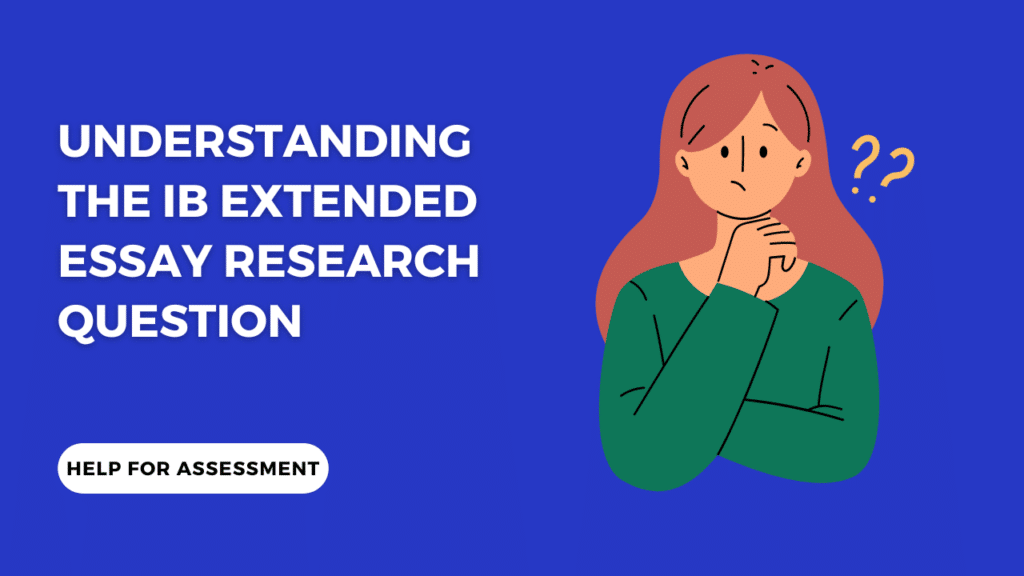We’ve written dozens of EEs in the last 12 months. In our experience, the Extended Essay research question is the most important part of the project. Get this right and you’ll be on your way to completing an essay that earns you 34 points.
The problem is:
Getting the research question right isn’t often as straightforward. Given that it’s the backbone of your research and the essay, it’s easy to feel the pressure that comes with the need to develop a research question that fits the scope of the project.
In this post, we give you some handy tips that can help you come up with a relevant research question for your Extended Essay project.
Key Takeaways
- An Extended Essay research question is the question you intend to answer throughout the 4,000-word assignment.
- You first have to choose a subject, select a topic, and then formulate your research question from the topic.
- The research question must be concise, direct to the point, and fall within the scope of the Extended Essay assignment.
Tips for Extended Essay Research Question
Here are some useful tips to help you develop the most relevant research question for your Extended Essay assignment:
1. Choose an Interesting Topic
The first step to coming up with a relevant research question for your Extended Essay is to choose an interesting topic.
Choosing an interesting topic – or an area you’ve always wanted to explore – means three things:
- You’ll not look at or treat the EE as a burdensome task.
- You’ll have an easy time developing your research question.
- You’ll easily immerse yourself in the topic and easily crank up the 4,000 words in the shortest time possible.
By immersing yourself in the topic that intrigues you, your enthusiasm will also shine through in the final grade of your Extended Essay.
You need to understand that engagement is one of the grading criteria outlined in the IB EE Grade Descriptor Document.
Reflection is important to achieve the highest marks in this criterion. These reflections should convey a significant level of intellectual and personal engagement to the topic that you choose.
2. Develop Your Research Question
Now that you have an interesting topic already selected, it’s time to develop a research question for the Extended Essay.
Here’s how to do it:
Your research question should be more specific than you initially think.
For example:
The question “Why do only some people act aggressively?” is exceptionally broad. It would require more than 4,000 words to answer.
A more suitable research question for an extended essay can be something like “to what extent does the MAOA gene contribute to violent behavior?”
Narrowing down your focus requires thorough research. In our example, the only way you would arrive at the idea of investigating the MAOA gene is if you had conducted extensive research on the topic.
The ultimate goal is to eliminate ambiguity in your research question. When narrowing it down, you must provide precise definitions for each term used.
For example:
If you are exploring the philosophy in Albert Camus’ writings, it is essential to specify that you are investigating absurdist philosophy and clarify its meaning.
3. Focus on a Research Question You Can Answer
Many students struggle to write Extended Essays because of choosing the wrong topic and formulating the wrong research question.
Such mistakes are common, but you don’t want to fall into this trap because it can set you back in terms of time, resources, and effort.
Understand that thorough research is crucial to determine the availability of background information necessary to address your question.
Mechanisms can be challenging to grasp. In the case of your EE research question, you must dedicate time to find out whether there’s enough existing information on the mechanism you intended to explore.
If you notice that there isn’t enough information to warrant continuing with exploring the research question, you should consider something else altogether.
The last mistake you want to make is to write a paper that will veer into excessive theoretical speculation. Sometimes simply rephrasing the research question into something different can go a long way to make a huge difference.
4. Avoid Making Assumptions
This primarily applies to subjects in the humanities.
Suppose you’re a history student planning to write an Extended Essay on Italy during World War 2.
After following the previous tips on how to write an Extended Essay research question, you may come up with a research question that looks something like this:
“How did Mussolini’s unethical policies weaken Italian morale during the Second World War?”
While this research question appears focused, it contains words like “unethical” and “weaken”. Here, we already assume the cruel nature and negative impact of Mussolini’s policies.
It would be more advantageous to maintain an objective and academic tone by avoiding such biased terms. A better starting point would be to ask whether Mussolini’s policies did or did not weaken morale.
5. Ask Someone to Proofread Your Research Question and Share Their Opinion
Did you happen to spot the typo in the research question provided earlier? If you did, it highlights the importance of having someone else review your work.
Having another person proofread your EE research question goes beyond simply correcting typos. They may also uncover hidden assumptions that you might have overlooked.
To receive the most valuable feedback on all aspects of your EE, consider asking someone with experience.
While your peers are a viable option, it would be even better to seek guidance from individuals who understand the requirements for achieving an A grade. Therefore, your teacher or former students from your school would be good choices.

